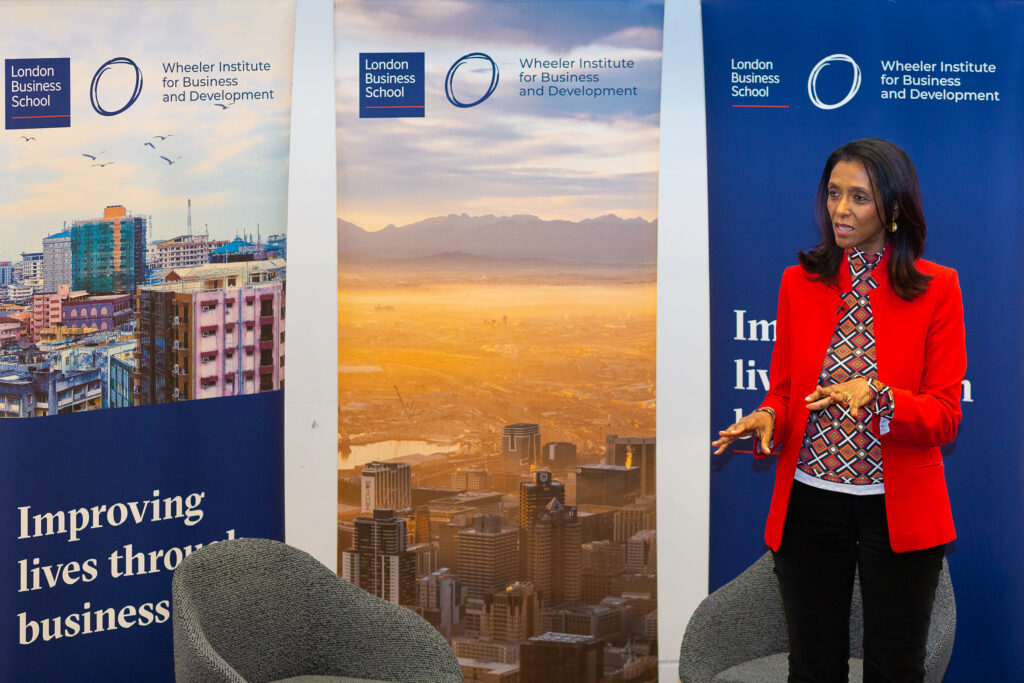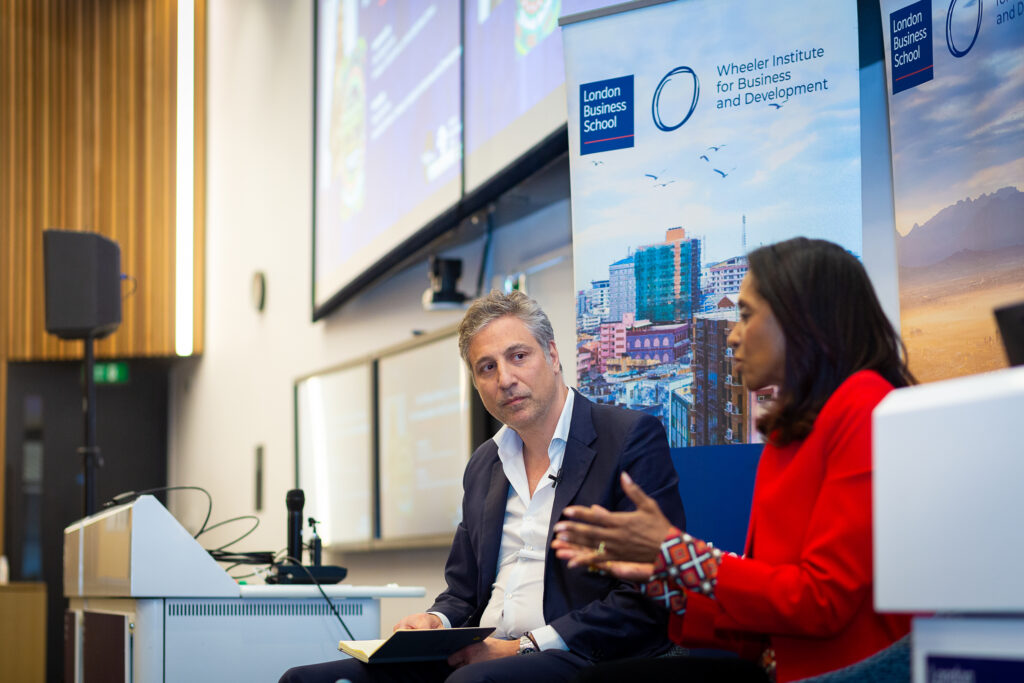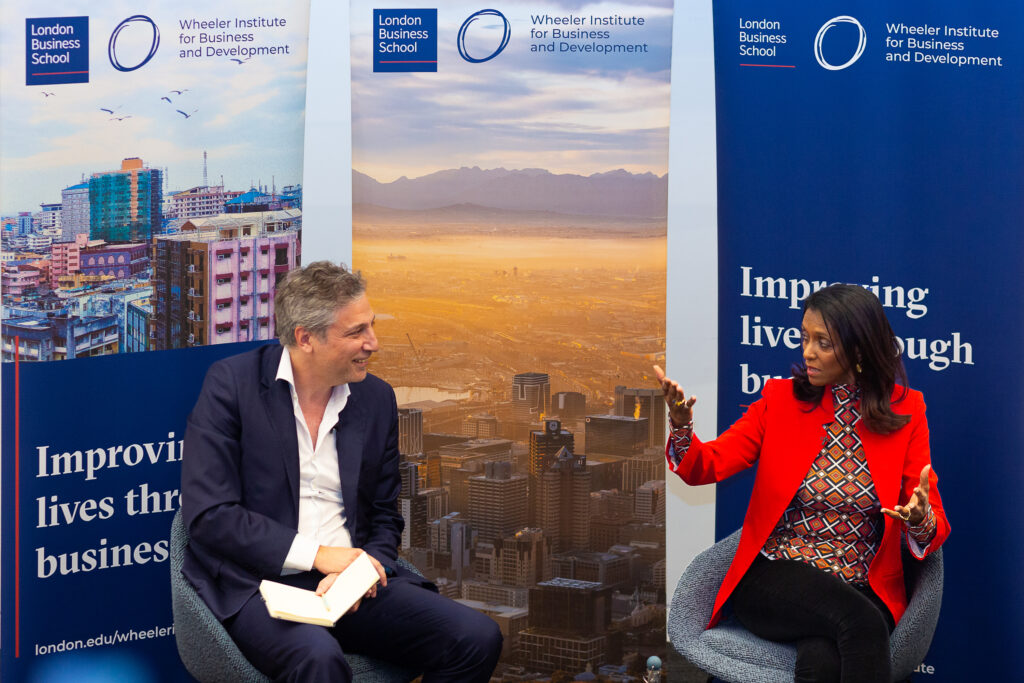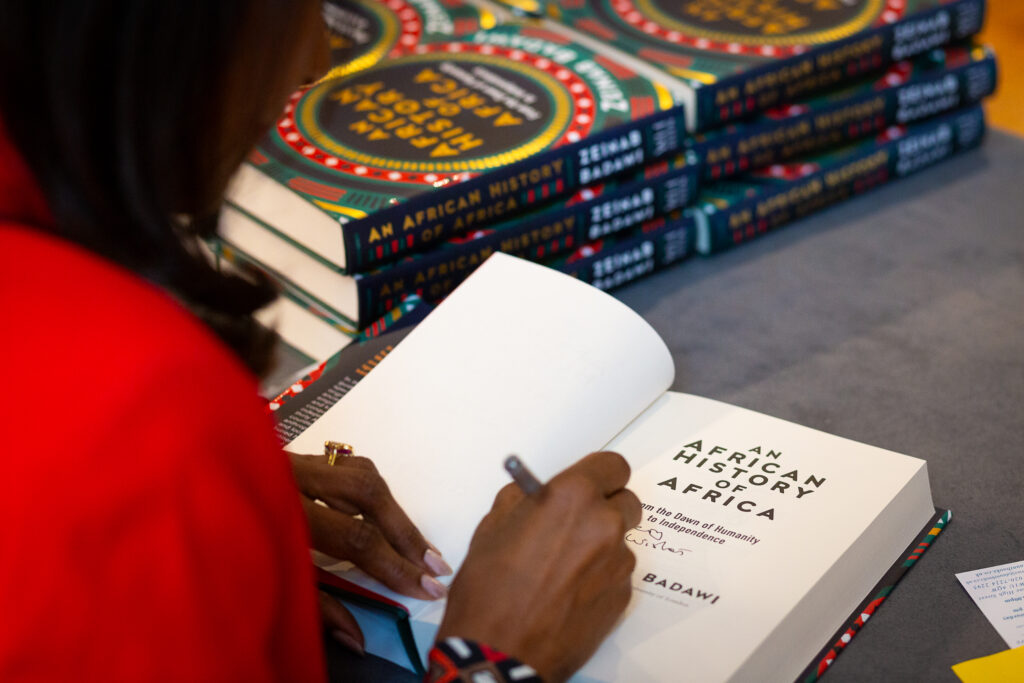On Tuesday 14th May 2024 the Wheeler Institute welcomed Zeinab Badawi (award-winning broadcaster, journalist, and President of SOAS University of London) to London Business School to discuss her new book, An African History of Africa: From the Dawn of Humanity to Independence. The event was moderated by Elias Papaioannou (Professor of Economics at London Business School and Co-Academic Director of the Wheeler Institute for Business and Development), and in collaboration with London Business School’s Black in Business Club and the Africa Business Club.
The Journey of Human Origins
Zeinab began her discussion by tracing the origins of the human species back to Africa. She highlighted the continent’s pivotal role in the history of humankind. After all, Homo Sapiens originated in Africa about 200,000 years before modern humans began to populate other parts of the world. As humans moved into Europe and Asia, they adapted to various climates and conditions, leading to diverse physical traits such as lighter skin and different eye colours.
By beginning with these origins, An African History of Africa not only emphasises the foundational role Africa played in shaping human history but also a singular truth: all humans share a common ancestry that is rooted in Africa. Zeinab emphasised her belief in this shared heritage as a powerful reminder of our interconnectedness and common humanity across the national and cultural borders that exist today.

Exploration of Ancient Civilisations
Next, the discussion delved into the rich history of some of Africa’s ancient civilisations, beginning in North Africa with Ancient Egypt. Often celebrated as one of the most magnificent civilisations, Egypt was notable for being the first centralised state with a sophisticated system of taxation and governance. The construction of the pyramids served as a testament to Egypt’s architectural prowess and as a symbol of nation-building.
Zeinab also took care to emphasise that Africa should not be viewed as a monolithic entity, but rather a melting point of diverse cultures and influences. For instance, the parts of Africa that border the Mediterranean were significantly influenced by European civilisations while East Africa had substantial interactions with Arabian cultures due to its proximity to the Red Sea. She also highlighted the lesser-known history of the Kingdom of Kush in Northern Sudan, which predates the ancient Greek civilisation and had powerful military confrontations with the Assyrians, the superpowers of the Middle East at the time. Moreover, she pointed out the extensive movement and exchanges among African people, contributing to the continent’s rich cultural mosaic and that these interactions helped shape the unique identities of various regions that we see today on the continent.
The Complexity of Slave Trades
Zeinab addressed the intricate history of slave trades involving Africa, highlighting significant differences between the Arab slave trade and the transatlantic slave trade. She noted that whilst the transatlantic slave trade, which occurred between the 16th and 19th centuries, is widely recognised, the Arab slave trade spanned a much longer period, beginning in the 7th century and continuing into the 20th century. The longevity of the Arab slave trade and its different cultural implications often receive less attention in the historiography of the continent.
The discussion turned to the critical differences between internal and external slave trades. The Arab slave trade primarily involved the capture and transportation of individuals for domestic work, with a notable number of women taken as slaves and concubines. This contrasted sharply with the transatlantic slave trade, where European traders predominantly targeted men for labour on plantations in the Americas. In the Arab world, children born to a slave and a free man had a chance of social mobility and could potentially be integrated into society, a stark contrast to the rigid racial hierarchies imposed in the Americas, where the status of being a slave was inherited and flowed through generations. Moreover, Zeinab highlighted that the indigenous forms of slavery within Africa were not based on racial hierarchies but were often a result of warfare or debt, with slaves sometimes being integrated into the households and communities of their captors. This is distinct from the racially motivated transatlantic slave trade, which dehumanized African slaves and treated them as property. Zeinab believes understanding these nuances is crucial for comprehending the full scope of slavery’s impact on African societies and its long-lasting effects on the continent and beyond.

Growth and innovation: the next generation of Africans
With a median age of just 19, Africa is home to the world’s youngest population. By the turn of the century, it is projected that half of the global workforce will be African. This demographic dividend presents a unique opportunity for economic growth and innovation. Badawi highlighted the potential of Africa’s youth to drive the continent’s development through entrepreneurship, technological advancements, and creative industries. She also underscored the importance of investing in education and healthcare to harness this potential effectively. By empowering young people with the skills and resources they need, Africa can leverage its youthful energy to achieve sustainable development and global competitiveness.
During the Q&A session, several topics were discussed, providing further insights into Africa’s historical and contemporary landscape. One notable question was about which countries have policies that could be replicated across the continent. Zeinab responded that while it depends on the unique context of each country, those with good governance, limited term limits for leaders, and an absence of conflict, could serve as models. Another intriguing discussion was on the comparisons between countries colonized by France and those by Britain, where she noted the different colonial approaches and their lasting impacts. Additionally, the session explored how modern African social movements draw inspiration from historical figures, such as Ya Asantewaa, and the earliest examples of African culture being exported, with ancient Egyptian art and artifacts as primary examples. On improving tourism, Zeinab pointed out that visa difficulties for foreigners remain a significant barrier.

Optimism for Africa’s Future
In concluding the conservation, Zeinab Badawi emphasised the importance of comprehending Africa’s rich and diverse history. She highlighted the significance of acknowledging the continent’s contributions to human civilisation and its complex historical narratives, as essential for fostering a more inclusive and global history. Her insights help illuminate the necessity to move beyond stereotypical representations of Africa and to appreciate its role as a cradle of human culture and innovation. Considering common global challenges such as climate change and geopolitical competition, the lessons of Africa’s past and potential of its future serve as inspiration for collective action and global solidarity. We hope that by embracing our shared heritage, we may have the opportunity to construct a more equitable and interconnected world.

Advance praise for An African History of Africa
Both a tour d’horizon and a tour de force, marvellously readable and beautifully written. This is a book that should be read by anyone who is interested in Africa, by anyone who thinks they know all they need to know about Africa, and above all by anyone who has no interest in Africa at all. It will transform their views of the continent, its peoples and its histories. I cannot recommend it too strongly or praise it too highly.
Sir David Cannadine (Dodge Professor of History, Princeton University)
Zeinab Badawi’s remarkable new book lives up to her dependable standards of excellence. It takes the reader on an up-close-and-personal journey across this unique continent, seemingly holding your hand while uncovering extraordinary gems of truth as she allows previously untold stories to be heard.
Margaret Busby CBE (Editor, Writer, Broadcaster and Former Publisher, current President of English PEN)
This is a book we have needed: a clear account of the fascinating history of Africa from an African
William Hague (Writer and former politician, current Chair of the Royal Foundation of The Prince and Princess of Wales)
perspective. I learned something on every page. It will leave everyone who reads it better informed and more thoughtful about the vast opportunity that can now be found in a continent we have often misunderstood.
One of the greatest strengths of this wonderful African History of Africa and what makes it so engaging is the way Zeinab Badawi narrates the great sweep of this continent’s rich history as a personal voyage of discovery, and in doing so is able to portray her feelings of the experience, be it touching humanity’s most ancient bones or venturing into the dungeons of slave castles’
Dr Kevin Shillington (Author of History of Africa)
About the speakers

Zeinab Badawi is a Sudanese-British journalist. She was the first presenter of the ITV Morning News and co-presented Channel 4 News with Jon Snow from 1989 to 1998 before joining BBC News. Badawi was the presenter of World News Today, broadcast on both BBC Four and BBC World News, and Reporters, a weekly showcase of reports from the BBC. In 2021, Badawi was appointed as president of SOAS University of London.

Elias Papaioannou is a Professor of Economics at London Business School, and Co-Academic Director of the Wheeler Institute for Business and Development. In the academic year 2019/2020, Elias held the Varian Visiting Professor of Economics at the MIT Department of Economics. His research has been recognised with a consolidator ERC grant in 2018, the inaugural 2013 European Investment Bank Young Economist Award, the 2005 European Economic Association’s Young Economist Award, and the Royal Economic Association’s Austin Robinson Memorial Prize, 2008. He is a research affiliate of the Centre for Economic Policy Research.
About the author

Donald Innocent-Ike, MBA2025 is an Outreach and Communications Intern at the Wheeler Institute for Business and Development. After graduating from Georgia Institute of Technology with a Bachelor’s degree in Electrical Engineering & Economics and a Master’s in Computer Science & Quantitative Finance, Donald worked as a Graduate Research Assistant, before becoming an Associate at Truist Securities in Atlanta. He has a keen interest in finance, development, and business as a force for good, particularly in emerging markets.
Discover our research portal and subscribe to our mailing list now
